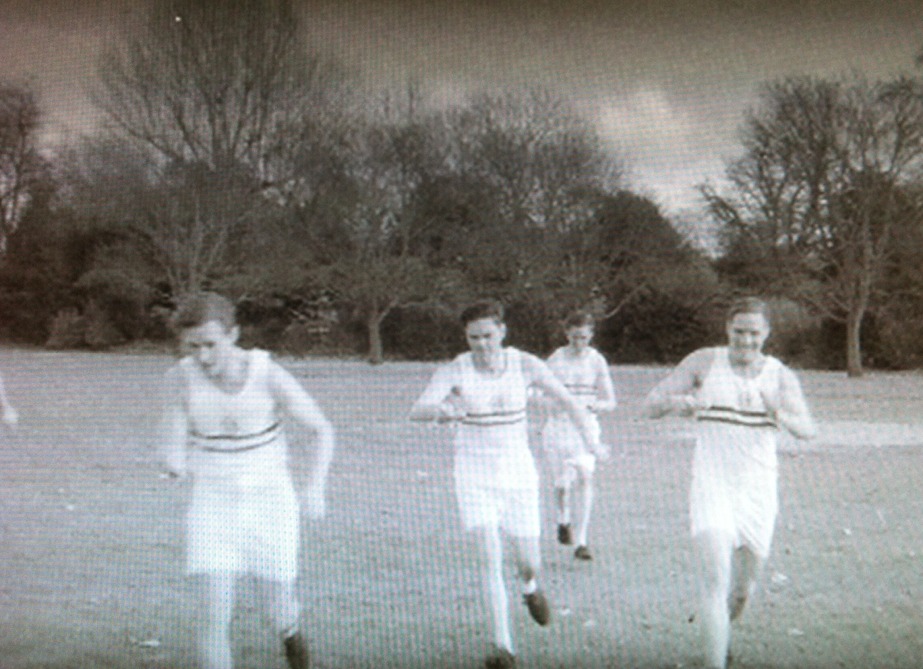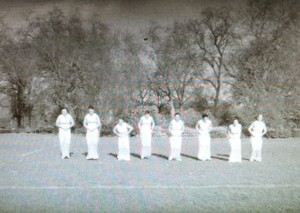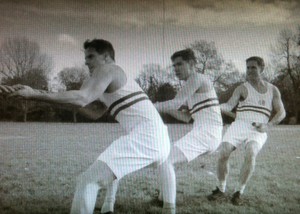“Family is what disappears when you’re not looking at it.”
—Keith Chadwick
The ancestors of Tom’s who come to the forefront in episode three of HBO’s Family Tree are Tom’s grandparents, William and Victoria Chadwick, and William’s sister, Victoria, the great-aunt who gave Tom the trunk of family heirlooms that began his his genealogical journey. Tom doesn’t seem to know much about any of them at the outset, though he spent time with them all in life.
After paying his respects at their graves, Tom returns to his mysterious trunk and coincidentally pulls out a vest tank top and a newspaper clipping related to his grandfather’s appearance in the 1948 London Olympics. Visits to the local antiques shop and his grandfather’s boxing gym fill in the details of the ’48 Games in London — the “Austerity Games” — held when the UK was still rebuilding after the war. Though the games were not austere as the running gags throughout the episode suggested, the athletes’ food was rationed (they received double what the typical Brit was entitled to) and no new venues or athlete housing was built (as the city was still rebuilding and many residents still homeless).* Naturally, Tom’s grandfather was knocked out in his first match, but he provides Tom’s first encounter with the real history his ancestors lived through.

“Vintage footage” from the ’48 Olympics of the egg-and-spoon race
The episode’s first big revelation that William and Victoria had a ne’er do well brother, Brian, emerges when Tom visits the woman to whom Victoria left her flat, apparently the lesbian life partner no one in the family knew about. A bittersweet exchange captures Tom’s sense of obligation to keep on with what he calls “The Search.”
Mildred: Just before she died, Vic said that she hoped you might be the one to carry it on.
Tom: Carry on what?
Mildred: I don’t know.
Tom: (Nods.) I will.
The major surprise (won’t call it a cliffhanger since you have to have built dramatic tension to have one, and this show has little) is that Tom found the birth certificate of his great-great-grandfather, Charles Chadwick, who was born in… Maryland! “I’m a Yank?!” Tom’s father protests. Roll credits.

Austerity Games: Potato sack race
Fortunately this episode did not include yet another horrific blind date. Instead, Tom bonds with the daughter of the antiques shop proprietor, who recently called off her engagement. The cringe-inducing scene — seemingly obligatory in this series — was Tom’s sister’s first ventriloquist performance, about which the less said the better (I seem to write that a lot in these recaps).

Austerity Games: Tug of war
As the series proceeds, Tom’s actual research is increasingly pushed to the background. Whatever effort went into finding his grandparents’ graves, or more interestingly, locating his great-great-grandfather’s birth certificate (or even determining who his gggf was) or finding Victoria’s will online (?!), all happened off-screen, putting the focus of the episode on Tom’s uniformly bizarre encounters with the living people who can advance his story beyond the records and heirlooms he finds on his own. Typically the allocation of time in real genealogical research is the reverse, though bungled wildcard searches may not be appropriate sitcom fodder. Perhaps if we were all comfortably unemployed like Tom, we could make heritage trips and track down distant relatives to our hearts’ content!
Whatever his approach, it seems finally to have gotten at least one of his family members to take “The Search” more seriously. After her failed gig, his sister reflected on the wedding guests who were her audience:
They were happy as a family, it seemed. It just felt like to be in a room with such a big family, it sort of felt that maybe Tom was into the right track looking into family. Maybe we’ll feel some sort of connection, I don’t know, it just sort of struck me.
—Bea Chadwick
* What actually happened, not mentioned in the episode, is that shortly before Germany invaded Poland, London was chosen to host the 1944 Games. Shortly after the war ended, the UK decided to keep London in consideration to host in ’48 as a national morale-booster. Unsurprisingly, the 1940 Games also did not happen. They would have taken place in… Tokyo. Germany and Japan were not invited to the 1948 Games, though Italy was since they switched sides in ’43. The USSR was invited as well, but did not send any athletes, which Stalin later regretted once he realized the propaganda opportunity he had missed.
 Follow
Follow
B. and I loved the horrific blind dates! This episode was still funny without it but I thought they were hilarious. FREE BONE! FREE BONE!